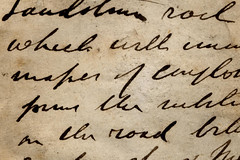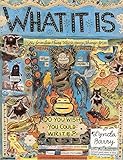 I am moving back in with my father. It’s only temporary–a month at most, or two. This return to the nest is a byproduct (and benefit) of living in the same city as my parents, and it seems I do it every few years, when I’m at the end of one phase of my life, and about to start another: before and after college, for example, and before and after graduate school. This time, it’s a new beginning for Patrick, who is bidding adieu to Vroman’s Bookstore, and taking a job at goodreads. (I hope that this will be a phase for me too: my Before-I-Sell-A-Book phase, which implies, of course, that there will be an After-I-Sell-My-Book Phase. One can dream, pray, beg, and revise like hell, right?)
I am moving back in with my father. It’s only temporary–a month at most, or two. This return to the nest is a byproduct (and benefit) of living in the same city as my parents, and it seems I do it every few years, when I’m at the end of one phase of my life, and about to start another: before and after college, for example, and before and after graduate school. This time, it’s a new beginning for Patrick, who is bidding adieu to Vroman’s Bookstore, and taking a job at goodreads. (I hope that this will be a phase for me too: my Before-I-Sell-A-Book phase, which implies, of course, that there will be an After-I-Sell-My-Book Phase. One can dream, pray, beg, and revise like hell, right?)
Because Patrick and I knew we would move within the year–new job or not–we purged our library, which I documented here. This week, we’ve dedicated ourselves to purging and organizing our papers. I realize now that, while I don’t hold much attachment to objects, photos, and old clothing, I have trouble letting go of…text. I resisted getting rid of my books–all those stories and characters and sentences!–and that same resistance returned when it came time to purge old letters, college essays, birthday cards and journals–all those stories and characters and sentences! In fact, my resistance never waned; whereas I easily shipped off half of my library, I am keeping most of these personal papers. Instead of discarding, I filed.
I devoted an entire file to a poet friend; if I could, I’d give her letters a whole room, an entire castle. In 2004 she wrote, “My job is boring, my heart aches, and I have growing affection for a group of 12-year-old boys who think of me only on Thursday evenings, when I become an easy target for jokes in a language I cannot speak. Maybe this enough. Maybe this is a life.” In 2009 she tells me: “The mackerel are running right now, so the porpoises are out there, too. If I could, I’d sit out there all day, watching the fog burn and settle, burn and settle, watching the ghost ships gain bulk then lose it. Alas, there is a world to inhabit!”
In his essay “Incomparable Naturalism,” Philip Hensher writes that Anton Chekhov’s short story endings suggest “a sense that life has been glimpsed here, and not glimpsed fully.” Reading my friend’s letters makes me feel the same way, as if, in these brief missives, I’m witnessing a glimmer of her full, glimmering life. Hensher also writes, “Chekhov’s world is, supremely, a world of things.” Perhaps because I’m moving, my world feels like this as well right now; is that why the watermelon-eating moment in “The Lady with the Dog” moves me so? I am so focused on things these days, of discarding them, packing them, transporting them. And my books and these old papers and letters–these say the most about my life than anything, any thing, could.
There’s this, too: In one old folder, I discovered a final evaluation letter from Dan Chaon, from whom I took a Fiction Workshop during my junior year at Oberlin. He wrote: “…my biggest concern is that there is a gap between the polish that you bring to your work and the level of emotional complexity that you are allowing into your stories.” He urges me to not to spend the winter break further revising the stories I’ve already written, but to devote my time “thinking about your demons and plunging into the stuff that’s more scary and disturbing and difficult for you.” This passage, nearly ten years later, hit me in the depths of my soul. Have I followed his instructions? It’s strong advice for a twenty-year-old who likes pretty sentences, and I can hear myself echoing it to my own students when I tell them to write through it, to use language not to detach, but to dive into the thickets of a story. I have endeavored to follow Dan’s advice, but I don’t know if I have always succeeded. The letter went into another file–one for drafts of my work, and responses to it from teachers, classmates, and friends. (There is a file, too, for my rejections, and a much thinner one, for my acceptances. Such is the life of a writer.)
Dan’s advice obviously affected me. It might help explain a letter from my grandmother, where she thanks me for sending her a copy of my first published story. She writes that my work is “dark and gloomy,” and adds, “I guess you would find me hopelessly old fashioned to like happy stories.” This, along her many poems, went into my file of family correspondence. There I now keep a number of cards from my father who is incredibly sentimental; he himself keeps everything my sisters and I have ever written him. I can almost see him, penning the bon voyage card he wrote to me when I left for graduate school; he knows I will keep it for years to come. “You’ll do well,” he writes. “You have been teaching since 609 [our old address number] when your class was your stuffed menagerie.” He wrote just the thing to ensure that I would never throw it away. In another letter, he hopes he will one day read of a great dad in my fiction, and know that it’s him I’m describing. Reading this, I felt a twinge of sorrow; in my first novel, at least, the father isn’t good. It’s fiction–but still, might he misread it as biography? These cards from him, they’re proof of something I haven’t yet been able to translate into story.
 Reading these old papers, I want to visit the work of Stuart Dybek, with his tales of childhood in Chicago. I want to re-read Lynda Barry’s What it Is, and do her writing exercises that ask you to make images with language, to remember; I want to pull from my memory the first ten cars I rode in; I want to remember other people’s mothers. I want to return to the past.
Reading these old papers, I want to visit the work of Stuart Dybek, with his tales of childhood in Chicago. I want to re-read Lynda Barry’s What it Is, and do her writing exercises that ask you to make images with language, to remember; I want to pull from my memory the first ten cars I rode in; I want to remember other people’s mothers. I want to return to the past.
The most treasured part of my correspondence takes up four files. Two are for letters from me, to Patrick; the other two are from him, to me. We began as co-workers, and then, when I went back to school, we were pen pals. Eventually, we lived in the same city again, and we became more than friends. If our relationship were a novel, it would be an epistolary one. Every year I write Patrick a love letter on Valentine’s Day, and they are all saved. I imagine some day, we will read them aloud to one another, and they will bring us back: to that large apartment in loud, parking-less Koreatown, to our low-ceilinged tree house in Iowa, and to the place we are currently packing up, and saying goodbye to.
Organizing these papers reminds me to save what matters, and, certainly, to put my thoughts, my gratitude, and my affection, in writing. If I send you something, please keep it.
Bonus Link: Linked by Words: Uncovering a Piece of Family History
[Image credit: Kevin Walsh]








